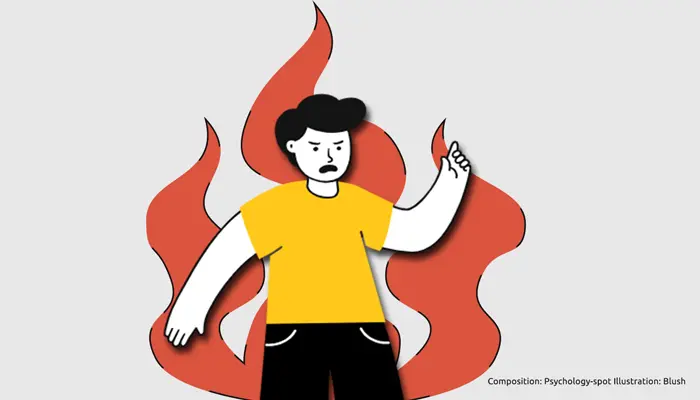
People get angry for all kinds of reasons, from the most trivial, such as someone that snatches their parking space to others much more serious, such as the terrible injustice that floods the world.
However, the truth is that in our day to day anger usually arises for trivial reasons, which is why the American Psychological Association (APA) has a section completely dedicated to anger management. Interestingly, their proposals closely resemble one of the oldest treatises on anger written by the Stoic philosopher Lucius Annaeus Seneca.
Seneca thought that anger was a temporary madness, and that even in cases where it is justified, as when we witness an injustice or suffer it in our own flesh, we should never act out of anger because, according to his words: “Other vices affect our judgment, anger affects our sanity: others come in mild attacks and grow unnoticed, but men’s minds plunge abruptly into anger”.
This philosopher referred to the fact that, unlike the rest of emotions, often the intensity with which we respond to anger is not related to the cause that originated it. For example, if we win 200 euros in the lottery we will be happy but if we win 500,000 euros we will be euphoric. The same goes for losses, the magnitude of our sadness or devastation will depend on the degree of the loss and its meaning. With anger it doesn’t happen the same thing. We usually react disproportionately, regardless of the cause.
Social networks are a perfect means to check what Seneca said centuries ago. Many people react with an exaggerated rage at any opinion that goes beyond their thought patterns. The problem is that anger, in addition to causing totally unnecessary harm to others, also affects who suffers it. In this regard, Seneca said: “Anger: an acid that can do more harm to the vessel in which it is stored than to anything on which it is poured.”
The idea of Epictetus: To be like a rock
The good news is that we can learn to manage that “temporary madness”. We can implement the advice of another Stoic philosopher, Epictetus, who instructed his students by telling them: “Remember that it is we who torment, we who make difficulties for ourselves – that is, our opinions do. What, for instance, does it mean to be insulted? Stand by a rock and insult it, and what have you accomplished? If someone responds to insult like a rock, what has the abuser gained with his invective?”
He was right. It is obvious that we are not rocks and that developing that impassive attitude towards insults requires time and a lot of practice, but once we manage to apply it, things will change. The most curious thing is that when someone insults us but we refuse to follow his game, that person continues to accumulate anger while we maintain our serenity and inner peace. In practice, it is like rejecting an “unwanted gift” that can only hurt us.
Of course, there will always be those who say that anger is a correct response to certain situations of injustice, and that, moderately, it can be a motivating force for action. However, this discourse is usually born from the desire for revenge, another emotion that does not lead us to a successful conclusion, or from the frustration and the sense of being unable to take control in any other way than through the exercise of power and violence.
Regarding the speech about moderate anger, Seneca said that it is like talking about flying pigs: there is simply no such thing. Anger can never be moderate. When it comes to motivation, the Stoics preferred we feel driven to action by positive emotions, such as the desire to do justice, help someone or make the world a better place. From this perspective, anger is simply not necessary, and in fact, often gets on our way leading us to make bad decisions.
That does not mean that we should feel bad when it appears, since it is an emotion and, as such, we must validate it, but it is not necessary to cling to it and let it grow.
5 tricks of the Stoic philosophers to manage anger
1. Do preventive meditation, which means that you should reflect on the situations that normally trigger your anger. Then, decide how you will react when they happen again. Often, resorting to visualization is helpful because it will allow you to manage that emotion in a harmless context and later, when it happens, you will not lose your temper but you will know exactly how to behave.
2. Learn to detect the first signs of anger, so you can stop them in time. If you wait too long, anger will simply explode and you will not be able to contain it. It will help you a lot to think of anger as if it were just clouds in your mind, now they are there but if you do not cling to them, they can follow their course moved by the wind.
3. Cultivate inner peace. If you are in peace with yourself, if you feel serene and calm, it will be difficult to light the fuse of anger in you. In many occasions, anger is the expression of irritability and an inner anger, so it is convenient that you cultivate in your day to day a state of relaxation and tranquility of mind. Remember that a relaxed mind is not usually angry.
4. Practice cognitive distancing, or what Seneca called the “delay” of the answer. It’s about taking a breath when things threaten to get out of control, so you can take a psychological distance from the situation that allows you to respond wisely, instead of just reacting.
5. Change your body to influence your mood. Emotions influence the postures you adopt but you can also moderate emotions by changing your posture. For example, at the first signs of anger, it is convenient that you lower your voice, try to take a deep breath and walk more slowly. Those little signals will tell your brain that everything is fine and there is no need to respond with anger.



